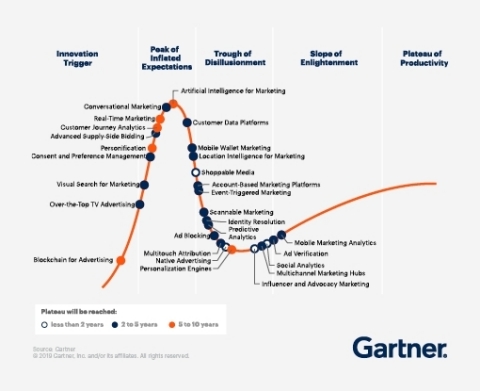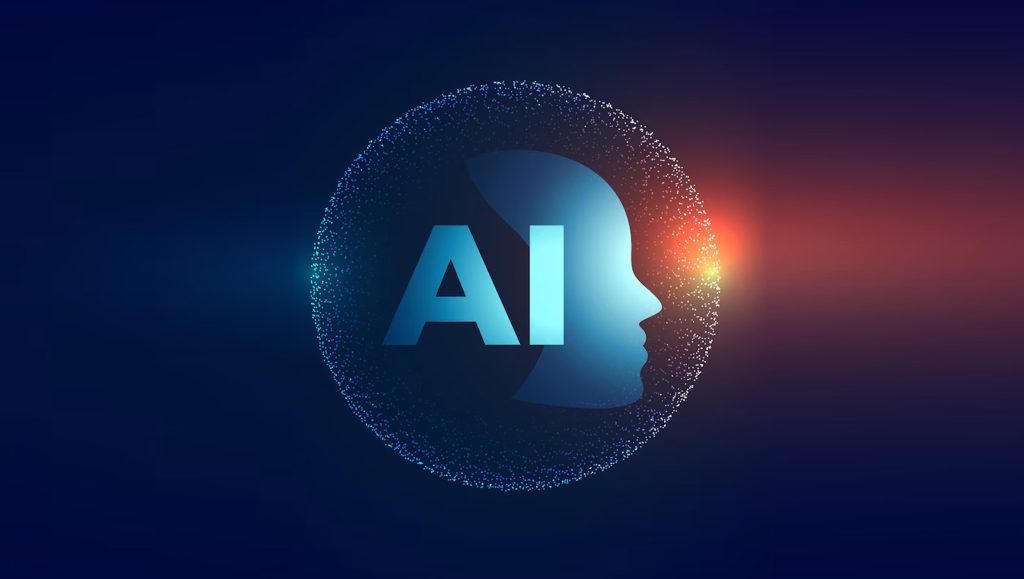Hype Cycle for Digital Marketing and Advertising 2019 Provides Insights on Prioritizing Marketing Technology Investments
Artificial intelligence (AI) for marketing, customer data platforms (CDPs) and real-time marketing are some of the technologies at the Peak of Inflated Expectations in digital marketing and advertising, according to Gartner, Inc.
Among the 28 technologies represented in the Gartner Hype Cycle for Digital Marketing and Advertising 2019 report (see Figure 1), four technologies have the capability to transform how marketers run their technology ecosystems and, ultimately, deliver meaningful customer experiences.
“Marketers today must strike the right balance between delivering meaningful customer experiences that differentiate their brands and focusing on providing real value to the business,” said Mike McGuire, a vice president analyst in Gartner’s Marketing practice. “Event-triggered and real-time marketing will have the biggest impact on marketing activities in the next five years. However, before marketers can realize the benefits of these technologies, they must first become proficient in predictive analytics and delivering personalized communications.”
Read More: Leading Live Festival Event Experience Platform Acquires Event Genius
Gartner has identified four technologies that have the capability to transform how marketers run their technology ecosystems. They include:
Customer Data Platforms
Marketers’ expectations for CDPs remain at an all-time high, but the reported use of the technology differs from the advertised capabilities. Half of enterprise marketers surveyed by Gartner who have deployed a CDP say it’s their CRM system, which indicates a misperception of its purpose and unique differentiators. However, CDPs movement through the Hype Cycle has slowed due to mounting confusion on the saturation and variety of vendors, and feature overlap with similar technologies.
Attempts to differentiate based on auxiliary features — such as customer journey design and optimization, rule-based attribution, final-mile campaign execution, and website personalization — highlight redundancy with other, more mature marketing technologies.

AI for Marketing
In its two years on the Hype Cycle, AI for marketing has quickly risen to the Peak of Inflated Expectations. The hype around this technology will not fade quickly, as AI continues to be the buzzword used to describe a host of features to augment the functions performed by marketers — from automated content tagging to real-time personalization.
Over the next 20 years, the power AI holds with marketers will drive pervasive shifts across the marketing technology ecosystem, effectively transforming the marketing practice. A Gartner 2018 survey revealed that 11% of marketing technology executives reported AI as their top choice as the technology that would have the most impact on their marketing efforts in the next five years.
Blockchain for Advertising
Blockchain for advertising holds tremendous promise for marketers. However, significant challenges with scalability, performance and adoption must be overcome before blockchain can alter the status quo. Dozens of companies have launched experimental blockchain platforms for advertising, but none have been able to demonstrate ongoing viability.
Despite the skepticism, the technology is gaining momentum through support from organizations such as the Interactive Advertising Bureau (IAB) and emerging innovations from technology companies such as IBM, Comcast and Amazon, which are working with industry leaders on the buy and sell side of media. Disruptive challengers from outside the industry are also adding urgency.
Read More: Over 53% of Social Media Logins Are Fraud! Can Customer Data Be Trusted?
Real-time Marketing
Advances in technology are creating an environment characterized by on-demand marketing, not just always-on marketing. Search technologies and social media make it easy to share, compare and rate experiences while they are happening. Ignoring the real-time nature of customer behavior and expectations leads to lost opportunities or, worse, development of full-scale media crises.
Leading brands — in travel and hospitality, financial services and insurance — are combining behavioral analytics and marketing automation to serve up the right offer or message at the right time based on specific customer behaviors. To date, most real-time marketing use cases focus on demand generation, advertising, promotion, sales and service.
However, many multichannel marketers still struggle for relevance in core customer engagement moments and lack a clear business case for real-time engagement. Gartner’s 2019 Multichannel Marketing Survey showed that less than half of respondents (44%) use predictive modeling or rigorous testing to determine if a real-time response is warranted when designing event-triggered marketing. To close the gap, marketers must look to revamp processes and make greater use of marketing technologies for customer data gathering, analysis and activation.
In addition, Gartner guides marketers to continue to monitor and be aware of other technologies such as conversational marketing and multitouch attribution, which are high impact and moving forward.
Read More: TIDAL Unveils Playable Video Sharing Capabilities For Instagram Stories





















